Contents
- 1 The Best Teas for Constipation
- 1.1 Best Teas for Constipation 1: Senna Tea
- 1.2 Best Teas for Constipation 2: Peppermint Tea
- 1.3 Best Teas for Constipation 3: Ginger Tea
- 1.4 Best Teas for Constipation 4: Fennel Tea
- 1.5 Best Teas for Constipation 5: Green Tea
- 1.6 Best Teas for Constipation 6: Licorice Root Tea
- 1.7 Best Teas for Constipation 7: Black Tea
- 2 Best Teas for Constipation Precautions
- 3 Mechanisms of Best Teas for Constipation
- 4 Additional Tips for Constipation Relief
Best teas for constipation: Many individuals suffer from the unpleasant and common digestive disorder of constipation at some time. This illness can be exacerbated by one’s way of life, nutrition, and even stress. Despite the availability of several OTC medicines, many still choose more natural approaches. Tea, for example, has been used as a treatment for many ailments for generations. Some teas have been shown to have a calming effect while also helping to accelerate digestion. Therefore, the following best teas for constipation may help you find relief.
The Best Teas for Constipation
Some of the most effective teas for relieving constipation are discussed below.
Best Teas for Constipation 1: Senna Tea
Senna has been used for generations as a natural remedy for relieving constipation due to its effective laxative properties. Sennosides are chemicals in the senna plant’s leaves and pods that promote regular bowel motions. Senna tea has several health benefits, but drinking too much of it can cause cramps and diarrhea, so moderation is key. This is one of the best teas for constipation. However, you must be careful.
Here are instructions on how to make senna tea:
Ingredients:
- Senna leaves: The show’s star is known to add a bit of ‘whoosh’ to your system.
- Hot water: Our trusty sidekick in all tea endeavors.
The Steps to Brew-tiful Senna Magic:
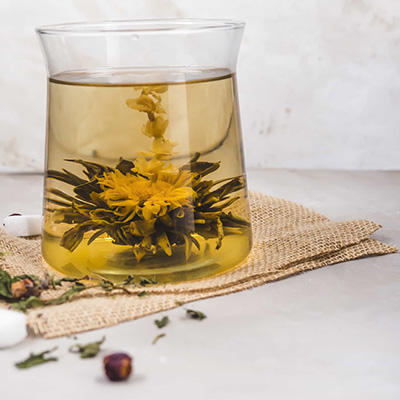
- Leafy Love: Get hold of those senna leaves. Depending on your boldness, you’ll need about 1-2 teaspoons.
- Water’s Rendezvous: Fill a kettle with cold, fresh water. You’re about to bring it to boiling point, and in a while, it’ll be steaming with excitement.
- Leaf Meets Water: Introduce your senna leaves to their hot date for the night: freshly boiled water. Dive those leaves into a teapot or your best mug, then shower them with the water.
Pop on a lid or a saucer so they have some privacy for their steamy infusion session. Steeping time: 5-10 minutes. Remember, this isn’t just tea—it’s an experience.
- Liberation! (optional): Want to separate the leafy remnants from your clear, amber brew? Use a strainer as you pour. After all, we’re here for the tea, not a crunchy snack.
- Serve with Flair: Slide your amber-hued potion into your favorite cup. Feel free to wink at it; you’ve just made something special.
- Customize (But with Caution): If you want to jazz up your cup, consider a hint of honey or a slice of lemon. But remember, senna has its distinct character. You wouldn’t want to overpower it too much, would you?
- Sip Sensibly: Enjoy your senna creation. Just a heads up, Senna is nature’s way of clearing the decks. So maybe don’t plan any marathon meetings or long hikes immediately after.
And there you have it—a cup of senna goodness brewed with fun and flair. Cheers to intelligent sipping!
Best Teas for Constipation 2: Peppermint Tea
Peppermint tea has been shown to ease gastrointestinal distress and stimulate bowel activity. Its menthol content, which has antispasmodic qualities, can help relax the GI tract’s muscles and facilitate more regular bowel motions. No wonder it is one of the best teas for constipation.
Here’s a simple method for making peppermint tea:
Ingredients:
- Fresh or dried peppermint leaves
- Hot water
Instructions:
- Fresh Leaves: Take a handful of fresh peppermint leaves and wash them under running water. Gently pat them dry using a kitchen towel.
- Dried Leaves: If you use dried peppermint leaves, 1-2 teaspoons will usually suffice for one cup of tea.
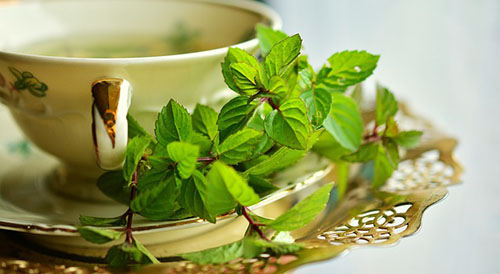
Boiling the Water:
- Heat water in a kettle or saucepan until it reaches a boil.
Steeping the Tea:
- Place the fresh or dried peppermint leaves into a teapot or a teacup.
- Pour the hot water on the peppermint leaves.
- Cover the teapot or teacup with a lid or a small plate to keep the essential oils from evaporating.
- Allow the tea to steep for 5-10 minutes. The longer you steep, the stronger the flavor. Adjust the steeping time to match your taste preference.
Straining the tea (optional):
- If you prefer not to have leaves in your cup, you can strain the tea as you pour it into it.
Serving:
- Once the tea has steeped to your desired strength, pour it into a cup. If you’ve used a teapot, it might have its filter; if not, you can use a separate tea strainer.
Customizing:
- For added flavor or sweetness, consider adding a slice of lemon, a tablespoonful of honey, or even a stick of cinnamon.
Enjoy:
- Sip your peppermint tea and enjoy the refreshing and soothing flavors!
Note: You can also purchase peppermint tea bags from many stores for a more convenient option. In this case, boil water, pour over the tea bag, and steep for the recommended time, usually around 5 minutes.
Best Teas for Constipation 3: Ginger Tea
Ginger, a warming root, has been shown to aid digestion and promote regular bowel motions. Drinking ginger tea, which has been shown to relax the intestines and minimize gas, can alleviate constipation. Ginger is a valuable addition to this list of the best teas for constipation.
Here are some instructions on how to make ginger tea:
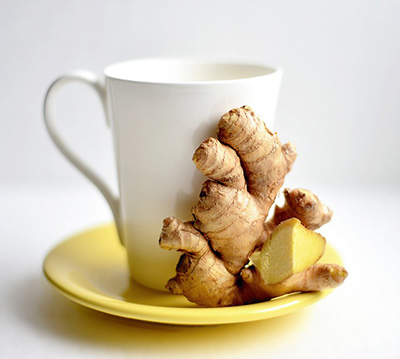
What You’ll Need:
- Fresh ginger root: The superstar. About a thumb-sized piece should do the trick.
- Water: Plain ol’ H2O, about 2 cups.
- Optional add-ins: Honey, lemon, or even a cinnamon stick if you feel fancy.
Prep That Ginger:
- Give your ginger a good scrub (it’s been underground, after all). You don’t need to peel it unless you want to.
- Slice it into thin rounds. The lighter, the better, ’cause more surface area = more flavor.
Water Time:
- Grab a pot or kettle and get the water boiling. Aim for tiny bubbles and a bit of steam just before cooking if you want to be a pro.
Ginger’s Big Dive:
Toss those ginger slices into the pot and reduce the heat. Let it simmer gently for about 10-15 minutes. The longer it simmers, the spicier and more robust your tea will be. Adjust according to how adventurous you’re feeling!
Strain and Pour:
Using a filter (or your ninja-like pouring skills), pour the tea into your mug, leaving the ginger pieces behind.
Fancy It Up:
Sweet tooth? Drizzle in some honey. Love a citrus kick? Squeeze in some lemon juice. Want a bit of warm spice? Drop in that cinnamon stick. Mix and match to your heart’s content!
Enjoy!:
Take a moment, inhale the spicy aroma, and then take a sip. Ahh, perfection!
And that’s it! Super easy, right? Ginger tea is excellent for feeling under the weather or wanting something warm and soothing. Cheers to cozy vibes and spicy sips!
Best Teas for Constipation 4: Fennel Tea
Fennel seeds have a long history of usage in folk medicine for gastrointestinal complaints like constipation. Fennel’s antispasmodic qualities make it simpler to evacuate feces by relaxing the digestive tract muscles, making it a fantastic addition to this list of the best teas for constipation.
Instructions on how to make fennel tea:
Ingredients:
- Fennel seeds: Approximately 1 to 2 teaspoons.
- Purified water: 250 ml (approximately 1 cup).
- Optional: Sweeteners such as honey or sugar, as per personal preference.
Preparation of Fennel Seeds:
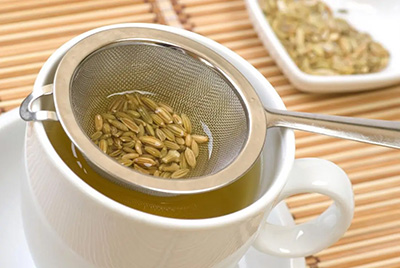
- Start by selecting premium quality fennel seeds. They should appear bright and have a fresh aroma.
- Using a mortar and pestle, evenly crush the fennel seeds. This will facilitate the release of the essential oils and provide a more pronounced flavor.
Boiling of Water:
- In a kettle or saucepan, pour the purified water.
- Heat the water until it comes to a rolling boil.
Infusion Process:
- In a ceramic or glass teapot, introduce the crushed fennel seeds.
- Decant the water onto the fennel seeds upon reaching the desired boiling point.
- Cover the teapot with its lid and allow the fennel seeds to steep for five to 10 minutes. The duration will depend upon the desired strength of the infusion.
Straining and Serving:
- Pour the tea into individual cups using a fine mesh strainer, ensuring the fennel seeds are retained within the filter.
- If a sweeter palate is preferred, one may consider introducing a modest amount of honey or sugar at this juncture. Stir gently to combine.
Consumption:
- Enjoy the tea while it is warm to appreciate its aromatic properties and flavors best.
Storage of Fennel Seeds:
Store the unused fennel seeds in an airtight container in a cool, dark spot to maintain the optimum quality of the new fennel seeds. Fennel tea is reputed for its potential digestive benefits. Thus, consuming it post-meals might augment its efficacy. Enjoy your refined beverage experience.
Best Teas for Constipation 5: Green Tea
Green tea’s ability to aid digestion is less well recognized than its antioxidant and weight-reduction potential. Its caffeine component may help accelerate bowel movements, but be aware that drinking too much of it can have the opposite effect. Green tea ranks high on the list of the best teas for constipation, but you must use it in moderation.
Green tea instructions:
Ingredients:
- Premium quality green tea leaves: Approximately 1 teaspoon.
- Purified water: 250 ml (approximately 1 cup).
- Optional: Sweeteners such as honey or sugar and accompaniments like a slice of lemon, as per personal preference.
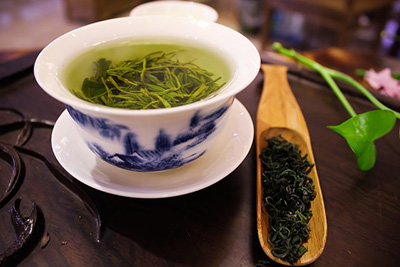
Selection of Green Tea:
- Choose a high-quality green tea in loose-leaf form or a tea bag. The leaves should possess a vibrant green hue and a fresh, grassy aroma.
Purification of Water:
- Use cold, preferably filtered water. It is imperative to ensure that the water is devoid of impurities to maintain the integrity of the tea’s flavor.
Heating the Water:
- Heat the water in a kettle or saucepan. However, unlike most teas, green tea requires water that does not boil to prevent bitterness. Aim for a temperature between 75°C and 85°C (167°F to 185°F).
Preparation of the Teapot or Teacup:
- Before introducing the tea, it’s advisable to pre-warm the teapot or teacup. To do this, swirl a small amount of the heated water in the vessel and discard.
Infusion Process:
- Place the green tea leaves or the tea bag into the pre-warmed teapot or teacup.
- Pour the heated water over the tea.
- Cover the vessel and allow the tea to steep for 1 to 3 minutes. The steeping time will vary depending on the variety of green tea and personal taste preferences. Consult the packaging for precise recommendations.
Straining and Serving:
- Using loose leaves, employ a fine mesh strainer to pour the tea into the serving cup, ensuring the leaves are retained.
- If desired, sweeteners or accompaniments can be added at this juncture. Stir gently to combine.
Consumption:
- Enjoy the tea while it remains warm, savoring the nuanced flavors and aromas unique to green tea.
Storage of Green Tea:
To preserve the freshness and quality of unused tea, store it in an airtight container, shielded from light, moisture, and strong odors.
It’s paramount to remember that green tea, due to its delicate nature, can become bitter if brewed with too hot or over-steeped water. Proper adherence to the above instructions will ensure a superior beverage experience.
Best Teas for Constipation 6: Licorice Root Tea
Licorice root has been used for centuries as a gentle laxative that helps loosen the bowels. In addition to helping calm stomach upset, it contains anti-inflammatory qualities. Some people, especially those with hypertension or other health issues, may experience a rise in blood pressure after taking licorice root. Therefore, this is another one of the best teas for constipation that should be used in moderation.
Here are the instructions for crafting an impeccable cup of licorice root tea:
Ingredients:
- Dried licorice root: Approximately 1 teaspoon, either chopped or powdered.
- Purified water: 250 ml (approximately 1 cup).
- Optional: Sweeteners like honey or sugar can be added per personal preference.
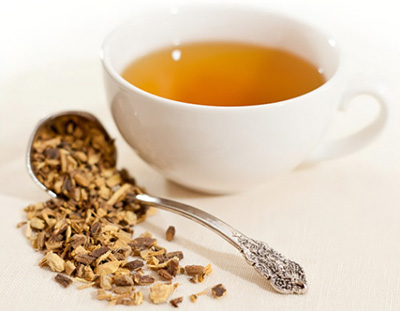
Selection of Licorice Root:
- Opt for a high-grade licorice root, ensuring its uniform appearance and exuding a fresh, sweet aroma characteristic of this particular root.
Water Purification:
- Begin with cold, ideally filtered, water to ensure the purity and the preservation of the licorice’s authentic flavor.
Heating the Water:
- Using a kettle or saucepan, bring the water to a rolling boil.
Infusion Process:
- Into a teapot or heatproof vessel, introduce the dried licorice root.
- Decant the freshly boiled water onto the licorice root.
- Cover the vessel with a lid, allowing the licorice root to steep for 7 to 10 minutes, depending on the desired potency of the infusion.
Straining and Serving:
- Using chopped licorice root, use a fine mesh strainer to transfer the tea to the serving cup, leaving the root fragments behind.
- If you opt for sweeteners, introduce them at this stage and stir gently until fully dissolved.
Consumption:
- It is advised to consume the tea while it is still warm, thereby maximizing the appreciation of its natural sweetness and distinct flavor profile.
Storage:
To maintain the utmost quality of the remaining tea, store it in a cool, dry place, preferably within an airtight container, protected from direct sunlight and external fragrances.
It is crucial to acknowledge that licorice root possesses inherent sweetness. Hence, one should exercise discretion when contemplating the addition of extra sweeteners. Additionally, those with hypertension or pregnant individuals should consult a healthcare professional before consuming licorice root tea. Diligent adherence to these instructions will culminate in a superior tea experience.
Best Teas for Constipation 7: Black Tea
Black tea may help promote bowel movements since it includes a tiny amount of caffeine, albeit much lower than the other best teas for constipation on this list. Theaflavins, which are present, have been demonstrated to improve gastrointestinal health.
Here are instructions for the preparation of an exemplary cup of black tea:
Ingredients:
- Premium black tea leaves: Approximately 1 teaspoon.
- Purified water: 250 ml (approximately 1 cup).
- Optional: Sweeteners such as sugar or honey, milk or lemon per individual preference.
Selection of Black Tea:
- Opt for a high-quality black tea in loose-leaf form or as a tea bag. The tea leaves should have a uniform appearance and exude a fragrant aroma.
Purification of Water:
- Use cold, preferably filtered water, ensuring it is devoid of impurities to maintain the integrity of the tea’s flavor profile.
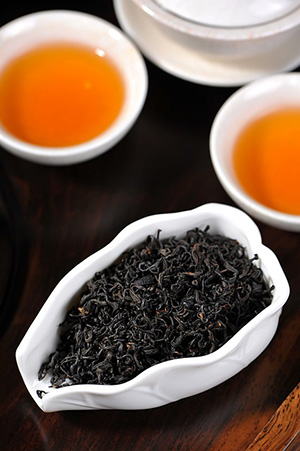
Heating of Water:
- In a kettle or saucepan, bring the water to a rolling boil.
Preparation of the Teapot or Teacup:
- It is advisable to pre-warm the teapot or teacup to maintain the desired temperature during the infusion process. Pour a small amount of the boiling water into the vessel, swirl, and discard.
Infusion Process:
- Introduce the black tea leaves or tea bags into the pre-warmed vessel.
- Decant the boiling water over the tea.
- Affix the lid onto the teapot or cover the teacup, allowing the tea to steep for 3 to 5 minutes. The precise duration will depend upon the specific variety of black tea and personal flavor preference.
Straining and Serving:
- Using loose-leaf tea, use a fine mesh strainer to pour the tea into the serving cup, ensuring the leaves are retained.
- Should you desire any add-ins, such as sweeteners, milk, or lemon, introduce them at this juncture and stir gently to combine.
Consumption:
- Imbibe the tea while it remains warm, savoring the rich flavors and aromatic nuances distinctive to black tea.
Storage:
To ensure longevity and preserve the quality of unused tea, store it in an airtight container in a cool, dark site, away from strong odors and moisture.
For an impeccable tea experience, it is essential to adhere strictly to the recommended measurements and steeping durations. Oversteeping may result in a bitter brew, detracting from the tea’s richness and complexity.
Best Teas for Constipation Precautions
You should see a doctor if your constipation persists or your symptoms are severe.
Although this list of the best teas for constipation may help, they should be used sparingly. Consuming more than your body needs might cause stomach distress and diarrhea.
A diet high in fiber, drinking enough water, and regular exercise can prevent constipation.
Constipation can be a nuisance, but mild natural therapies like tea can help. If you suffer from constipation occasionally, you may find relief by drinking one of the best teas for constipation mentioned above. Adopting a holistic approach to cures is essential for the best digestive health and carefully considering nutrition and lifestyle.
Mechanisms of Best Teas for Constipation
Senna Tea
- Sennosides: These are senna components responsible for their laxative action by irritating the intestinal lining.
- Long-term use: If used for an extended period, the bowel may develop a tolerance for the stimulant and lose some of its normal strength.
Peppermint Tea
- Menthol: Peppermint’s main ingredient, menthol, has antispasmodic properties and may help ease intestinal muscular spasms.
- Additional Benefits: Peppermint tea has several health benefits, including easing gastrointestinal distress, headaches, and menstrual cramps (Irritable Bowel Syndrome).
Ginger Tea
- Gingerols and Shogaols: Ginger’s muscle-relaxing components are especially useful for releasing stale air from a constricted digestive system.
- Digestive Enzymes: Ginger’s ability to boost stomach enzyme synthesis benefits digestion and bowel movement.
Fennel Tea
- Anethole: Fennel seeds contain a chemical that stimulates the digestive system, allowing for easier digestion and eliminating constipation.
- Gas Relief: Fennel’s soothing effects on the digestive system are multifaceted since it can help reduce gas and bloating.
Green Tea
- Catechins: Green tea contains catechin antioxidants that have been shown to aid digestive health. However, they may also induce hyperacidity in the stomach in certain people.
- Caffeine: Caffeine can help get things moving in the bathroom, but too much of it can cause dehydration, which makes constipation worse.
Licorice Root Tea
- Glycyrrhizin is licorice root’s principal active component. Its anti-inflammatory characteristics are a welcome bonus to its moderate laxative impact on the digestive system.
- Caution: High blood pressure and potassium loss might result from excessive or prolonged usage.
Black Tea
- Theaflavins: These polyphenolic chemicals promote digestive wellness and protect against inflammation and free radical damage.
- Tannins: Black tea contains tannins, which can induce constipation if drank excessively due to their drying impact on the mucosa.
Additional Tips for Constipation Relief
- Hydration: Drinking the recommended amount of water daily might help maintain soft stools and regular bowel movements.
- Fiber Intake: Vegetables, whole grains, and fruits are excellent sources of fiber, which can help normalize digestive function.
- Exercise: Exercise has been shown to improve digestion and bowel function by stimulating the intestines’ muscular function.
- Probiotics: Eating fermented foods or using probiotic supplements can help keep your gut flora in good shape and aid digestion.
This list of the best teas for constipation can aid with temporary relief. Still, it’s more important to deal with the root problems and take a comprehensive approach to digestive health. And as always, people have different reactions, and what helps one person may not help another. Constipation that does not go away or worsens calls for medical attention.
DISCLAIMER: All content on this website is presented solely for educational and informational objectives. Do not rely on the information provided as a replacement for advice, diagnosis, or treatment from a qualified medical expert. If you are pregnant, nursing, or have any preexisting medical concerns, talk to your doctor before using any herbal or natural medicines.
References
- Senna: https://www.medicalnewstoday.com/articles/322624
- Dandelion Root: https://www.medicalnewstoday.com/articles/322624
- Peppermint: https://www.healthline.com/health/digestive-health/tea-for-constipation
- Ginger: https://www.healthline.com/health/digestive-health/tea-for-constipation
